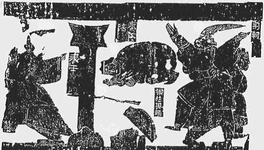Qin Shi Huang, Date of Birth, Place of Birth, Date of Death
TweetQin Shi Huang
First Emperor of Qin
 Date of Birth: 27-Jan-0258
Date of Birth: 27-Jan-0258
 Place of Birth: Handan, Hebei, China
Place of Birth: Handan, Hebei, China
Date of Death: 10-Sep-0210
Profession: statesperson
Zodiac Sign: Aquarius 
About Qin Shi Huang
- Qin Shi Huang (Chinese: ???; literally: 'First Emperor of Qin', pronunciation ; 18 February 259 BC – 10 September 210 BC) was the founder of the Qin dynasty and was the first emperor of a unified China.
- He was born Ying Zheng (??) or Zhao Zheng (??), a prince of the state of Qin.
- He became Zheng, the King of Qin (???) when he was thirteen, then China's first emperor when he was 38 after the Qin had conquered all of the other Warring States and unified all of China in 221 BC.
- Rather than maintain the title of "king" (? wáng) borne by the previous Shang and Zhou rulers, he ruled as the First Emperor (???) of the Qin dynasty from 221 BC to 210 BC.
- His self-invented title "emperor" (?? huángdì), as indicated by his use of the word "First", would continue to be borne by Chinese rulers for the next two millennia. During his reign, his generals greatly expanded the size of the Chinese state: campaigns south of Chu permanently added the Yue lands of Hunan and Guangdong to the Chinese cultural orbit; campaigns in Central Asia conquered the Ordos Loop from the nomad Xiongnu, although eventually it would also lead to their confederation under Modu Chanyu. Qin Shi Huang also worked with his minister Li Si to enact major economic and political reforms aimed at the standardization of the diverse practices of the earlier Chinese states.
- He is traditionally said to have banned and burned many books and executed scholars, though a closer examination renders the account doubtful.
- His public works projects included the unification of diverse state walls into a single Great Wall of China and a massive new national road system, as well as the city-sized mausoleum guarded by the life-sized Terracotta Army.
- He ruled until his death in 210?BC during his fourth tour of Eastern China.
Read more at Wikipedia

